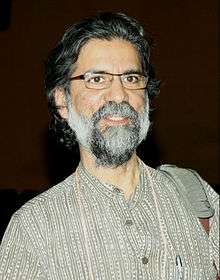Sanjay Kak

Sanjay Kak (born 1958) is a Kashmiri documentary filmmaker, whose work deals with social issues such as environmental activism and resistance politics. Kak studied economics and sociology at the University of Delhi, and is a self-taught filmmaker. Based in New Delhi, he is actively involved in the documentary film movement, and in the Campaign against Censorship and the Cinema of Resistance project.
His early work includes Punjab: Doosra Adhay (1986) about the Punjab in the days of the Khalistan struggle, and Pradakshina (1987), about the river Ganges. He followed this with a 1990 film about Cambodia's Angkor Wat temple, Angkor Remembered. In 1993 he released films about the Indian diaspora in England (This Land, My Land, Eng-land) and South Africa (A House and a Home). 1995 saw the release of Harvest of Rain.
One Weapon (1997) followed, "the documentary that marked Sanjay Kak as an explicitly political filmmaker", according to The Caravan magazine, and In the Forest Hangs a Bridge (1999) (about the making of a bridge in Northeast India; winner Golden Lotus Best Documentary Film, National Film Awards; Asian Gaze Award, Pusan Short Film Festival, Korea). His next films were Words on Water (2002), about the struggle against the Narmada dams in central India (which won Best Long Film prize at the Internacional Festival of Environmental Film & Video, Brazil) and Jashn-e-Azadi - How We Celebrate Freedom (2007) (about the Kashmiri freedom struggle).
Jashn-e-Azadi is a film that has "widely influenced the way Kashmir was perceived in India".[1] The film has had a chequered screening history.[2][3]
In 2008 he participated in Manifesta7, the European Biennale of Art, in Bolzano, Italy, with the installation A Shrine to the Future: The Memory of a Hill, about the mining of bauxite in the Niyamgiri hills of Odisha. He writes occasional political commentary, and is the editor of Until My Freedom Has Come – The New Intifada in Kashmir (2011).
His latest feature-length documentary is on the revolutionary Maoist movement in India, called Red Ant Dream. The film was under production for more than three years and released in 2013.
Filmography
- Punjab: Doosra Adhay (1986)
- Pradakshina (1987)
- Angkor Remembered (1990)
- This Land, My Land, Eng-land (1993)
- A House and a Home (1993)
- Harvest of Rain (1995)
- One Weapon (1997)
- In the Forest Hangs a Bridge (1999)
- Words on Water (2002)
- Jashn-e-Azaadi (2007)
- Red Ant Dream (2013)
Further reading
- Shuddhabrata Sengupta. "A Long March: Sanjay Kak’s cinema of rebellion". The Caravan. 1 July 2013.
- Sanjay Kak. "The Apparatus: Laying bare the state’s terrifying impunity in Kashmir". The Caravan. 1 March 2012.
- http://himalmag.com/gifts-people/